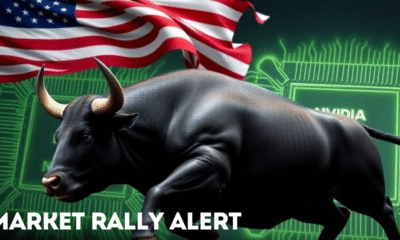Business
Trump’s Tariffs: A Global Economic Reckoning

Trump’s aggressive tariff policies have sent shockwaves through the global economy, leading to a significant sell-off in US government debt and raising fears of a recession. While aiming to boost domestic manufacturing and reduce trade imbalances, these measures have sparked retaliatory tariffs, increased consumer prices, and created widespread market uncertainty. The impact extends beyond the US, affecting international trade relations and prompting other nations to reassess their economic strategies.
Trump’s Tariff Strategy and Global Economic Fallout
President Donald Trump’s administration has implemented sweeping tariffs on imported goods, asserting these taxes will bolster American manufacturing and safeguard jobs. This approach, however, has triggered considerable volatility in global stock markets and a decline in the US dollar’s value. The International Monetary Fund (IMF) has consequently lowered its global economic growth forecast for 2025, anticipating the US will be the most severely impacted.
Key takeaways:
- Tariffs are taxes on imported goods, typically a percentage of the product’s value, paid by companies importing foreign goods.
- Trump’s stated goals for tariffs include encouraging the purchase of American-made goods, increasing tax revenue, and stimulating investment.
- The administration also used tariffs as leverage in broader negotiations, such as demanding that China curb fentanyl trade and pressuring Colombia on migrant deportations.
Impact on US Government Debt and Recession Fears
Confidence in the US economy has waned as investors have divested from government debt, driven by concerns over the tariffs’ repercussions. Interest rates on US 10-year government borrowing have surged to 4.5%, the highest since February, signaling an erosion of US bonds’ traditional safe-haven status. Economists warn that rising bond yields translate to higher borrowing costs for both companies and governments.
- JP Morgan has increased the likelihood of a US recession from 40% to 60%.
- The Federal Reserve may be compelled to intervene with emergency purchases of US Treasuries to stabilize the bond market.
- Tariffs are expected to increase domestic consumer prices as American companies importing goods pass on higher costs.
International Responses and Trade Deals
Trump’s tariffs have provoked retaliatory measures from various countries, escalating global trade tensions. However, some nations have also engaged in negotiations to mitigate the impact.
- China: Initially faced tariffs as high as 145%, leading to retaliatory levies. A recent agreement has suspended most of these tariffs for 90 days, reducing them to a 30% US tariff on Chinese imports and a 10% Chinese tariff on US imports.
- European Union: Trump recommended a 50% tariff on all EU goods, later reduced to 10% for a limited period, citing unproductive talks.
- Canada and Mexico: Faced 25% taxes on imports and a 10% levy on Canadian energy, prompting Canada to impose a 25% tax on some US vehicle imports.
- United Kingdom: Secured a landmark deal reducing car export tariffs from 27.5% to 10% for up to 100,000 cars and eliminating the 25% tariff on steel and aluminum imports. In return, the UK scrapped a 20% tariff on US beef and increased its quota.
- Colombia: Initially barred US military flights carrying deported migrants, leading to a threat of 25% tariffs on all Colombian goods. Colombia subsequently agreed to accept the flights, averting the tariffs.
Corporate Adjustments and Future Outlook
Companies worldwide are grappling with the uncertainty and increased costs imposed by the tariffs. Many are passing on higher expenses to consumers, while others are exploring strategic investments to navigate the new trade landscape.
- Adidas and Mattel are among the global firms that have announced price increases for American customers.
- Volkswagen is considering further
Sources
- Trump tariffs spark US government debt sell-off, BBC.
- What are tariffs, how do they work and why is Trump using them?, BBC.
- Colombia backs down on deportation flights after Trump tariffs threat, BBC.
- Landmark economic deal with United States saves thousands of jobs for British car makers and steel industry –
GOV.UK, GOV.UK. - Volkswagen flags ‘massive’ US investments and says tariff talks constructive, Reuters.
-

 Press Release5 days ago
Press Release5 days agoBellarium ($BEL) Price Prediction: Could It Hit $5 by 2026?
-

 Press Release2 days ago
Press Release2 days agoClinical Trials Market Set for Robust Growth, Driven by Drug Development Surge and Digital Innovation
-

 Press Release3 days ago
Press Release3 days agoIndustrial Boiler Market Expected to Surpass USD 24.4 Billion by 2035 Amid Growing Demand for Energy Efficiency and Industrialization
-

 Press Release3 days ago
Press Release3 days agoPreventive Vaccines Market to Witness Strong Growth by 2035
-

 Business4 days ago
Business4 days agoHow Managed IT Solutions Help Small Teams Compete at Enterprise Scale
-

 Press Release3 days ago
Press Release3 days agoGreen Bio Chemicals Market Poised for Sustainable Growth amidst Global Shift to Eco-Friendly Alternatives by 2035
-

 Press Release3 days ago
Press Release3 days agoFill-Finish Pharmaceutical Contract Manufacturing Market Expected to Flourish Amid Biopharmaceutical Boom and Global Outsourcing Trend by 2035
-

 Press Release3 days ago
Press Release3 days agoPet Food Nutraceutical Market Set for Robust Expansion Amid Rising Demand for Pet Wellness by 2035












